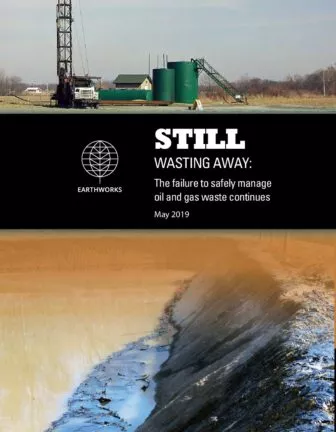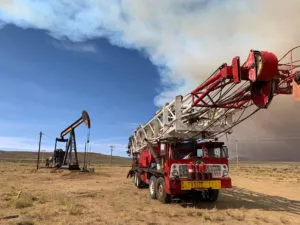In 2015, Earthworks published Wasting Away: Four states’ failure to manage oil and gas waste in the Marcellus and Utica Shale, which outlined the gaps in management and laid out solutions.
For this report, Still Wasting Away, we’ve found that many of the same problems with oil and gas waste persist, and therefore, many of our policy recommendations remain the same.
Still Wasting Away re-examines how oil and gas field waste has been tracked, regulated, and treated across the nation, where and how policy gaps have changed since 2015, and necessary steps that states and the federal government can take to prevent the environmental harm that results from evergrowing volumes of poorly managed toxic waste.
Still Wasting Away includes in-depth analysis of nine oil and gas producing states, each with a report of their own: California, Colorado, New Mexico, New York, North Dakota, Ohio, Pennsylvania, Texas, and West Virginia. Waste is frequently transported across the borders of these and other states, creating a complex web of waste management that begs for federal standards.
Report Introduction
The United States produces more oil and natural gas than any other nation in the world. Between now and 2030, the U.S. is on track to unleash 60 percent of all new oil and gas production globally – four times more than any other country.
Of the many impacts this fossil fuel extraction will have, there is one that is often overlooked. Being the world leader in oil and gas also means the U.S. leads in toxic oil and gas waste, which contains carcinogens, heavy metals, and radioactive materials. This waste is produced long after the drilling stops.
Today, most wells are hydraulically fractured and produce skyrocketing amounts of gaseous, liquid and solid waste. Though airborne pollutants are a serious threat to both people and climate, this report is an in-depth look at the liquid and solid waste streams generated by drilling and hydraulic fracturing, specifically:
- Where oil and gas waste is going, and where it should/should not be
- What disposal of toxic oil and gas waste means for our water and land
- How communities are affected by waste production, transport, treatment and disposal
- What policies need to change to protect the public and environment.
The trends revealed in this report are disturbing, from the accumulation of radioactive sediment in rivers to the contamination of drinking water, all from the poor management of oil and gas waste. The risks from this waste extend far beyond the places where it originates. It sometimes travels hundreds, even thousands, of miles across the country through unsuspecting communities.
We have to make sure that toxic oil and gas waste is managed carefully, and the recommendations at the end of this report can help.
Your Support Makes Our Work Possible
Earthworks helps families on the front lines of mining, drilling, and fracking. We use sound science to expose health, environmental, economic, social, and cultural impacts of mining and energy extraction. To support our efforts, please consider a tax-deductible donation today that will go toward our work reforming government policies, improving corporate practices, influencing investment decisions, and encouraging responsible materials sourcing and consumption.


